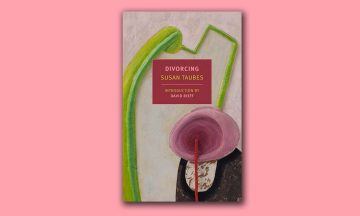Dustin Illingworth at the Paris Review:
 Susan Taubes’s fiction is animated by an unbearable awareness of death. Her first and only novel, Divorcing (1969), had the working title To America and Back in a Coffin. (An apt title, but deemed unmarketable and rejected by her publishers.) Like her contemporary Ingeborg Bachmann, Taubes’s fiction transposes existential mysteries with aesthetic ones. (There are other similarities between the pair: both published only one novel; both novels feature a love interest named Ivan; neither writer would live to see fifty.) Long out of print, Divorcing will finally be reissued by NYRB Classics this month. Taubes’s foreshortened oeuvre—this novel, an unpublished novella, a handful of stories—offers a range of formal precarities that mirror states of inward collapse. Fiction seemed to give shape to her own vulnerability. A lifelong depressive, she took her own life mere weeks after Divorcing was published. Her close friend Susan Sontag later suggested it was Hugh Kenner’s New York Times review that finally pushed Taubes over the edge. “Lady novelists have always claimed the privilege of transcending mere plausibilities,” he’d written. Sontag herself would identify the body.
Susan Taubes’s fiction is animated by an unbearable awareness of death. Her first and only novel, Divorcing (1969), had the working title To America and Back in a Coffin. (An apt title, but deemed unmarketable and rejected by her publishers.) Like her contemporary Ingeborg Bachmann, Taubes’s fiction transposes existential mysteries with aesthetic ones. (There are other similarities between the pair: both published only one novel; both novels feature a love interest named Ivan; neither writer would live to see fifty.) Long out of print, Divorcing will finally be reissued by NYRB Classics this month. Taubes’s foreshortened oeuvre—this novel, an unpublished novella, a handful of stories—offers a range of formal precarities that mirror states of inward collapse. Fiction seemed to give shape to her own vulnerability. A lifelong depressive, she took her own life mere weeks after Divorcing was published. Her close friend Susan Sontag later suggested it was Hugh Kenner’s New York Times review that finally pushed Taubes over the edge. “Lady novelists have always claimed the privilege of transcending mere plausibilities,” he’d written. Sontag herself would identify the body.
more here.
